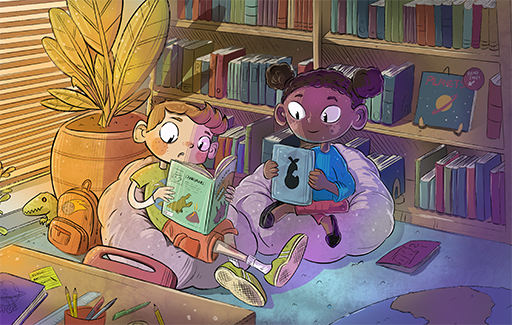Session 1: The importance of childhood reading
Introduction
Ensuring that all children become proficient readers is one of the key goals of primary or elementary education. Through reading (and more broadly, being literate), children are able to engage with other subjects in the school curriculum. Furthermore, reading is necessary for participation in many aspects of daily life.

Each child deserves to be supported to become a keen, capable and engaged reader. Teachers intuitively know that children who enjoy reading and who read frequently, tend to do well in school; in the last decade this anecdotal knowledge has been backed-up with hard evidence from large international studies. Children who are keen readers don’t only get better at reading and writing, they develop wider vocabulary and broader knowledge about the world. Reading can also make a significant contribution to the wellbeing of every individual and society as a whole.
The advantages, however, of being a keen reader go far beyond educational attainment and functioning in society; as the International Literacy Association (ILA) states:
Teaching children to read opens up a world of possibilities for them. It builds their capacity for creative and critical thinking, expands their knowledge base, and develops their ability to respond with empathy and compassion to others.
The ILA advocates for the ‘right to read’ to be recognised as a fundamental right for all children. Knowing that reading changes lives, learning to read and access to reading materials is therefore an issue of equality and social justice.
High quality reading instruction (comprising teaching strategies to promote word recognition, comprehension and decoding skills) is crucial for children to learn to ‘crack’ the alphabetic code, but instruction alone is not enough – children need to be able to read, and they need to want to read. Thus, the pedagogies, classroom practices and educator characteristics that support children to become engaged readers have the potential to enhance children’s educational attainment, their social and emotional wellbeing, and to enrich their lives.
This session explores why it is critical that every child has the opportunity to develop a lifelong love of reading.
By the end of this session, you will have:
- explored the concept of Reading for Pleasure and its significance in children’s education
- considered the connection and distinction between reading instruction and promoting reading engagement
- been introduced to the wider personal, social and emotional benefits of being a childhood reader
- started to consider representations of equality and diversity in children’s texts.

Before you start, The Open University would really appreciate a few minutes of your time to tell us about yourself and your expectations of the course. Your input will help to further improve the online learning experience. If you’d like to help, and if you haven’t done so already, please fill in this optional start-of-course survey [Tip: hold Ctrl and click a link to open it in a new tab. (Hide tip)] . Participation will be completely confidential and we will not pass on your details to others.
